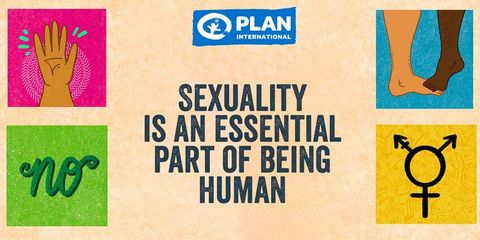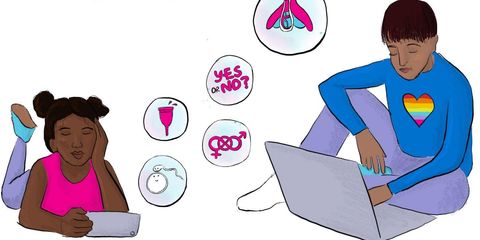Plan International is pleasure positive!
What has pleasure got to do with Plan International's work?
14 February 2023As a child and youth focused organisation, you may wonder what pleasure has to do with our mission and vision. How can sex positivity contribute to a world where all children, adolescents and youth in all their diversity can learn, lead, decide and thrive? Alexandra Pärnebjörk, Senior SRHR Advisor explains.
What is a pleasure-based approach and why is it important?

One of our core areas of work is to protect, promote and support adolescents’ and young peoples’ sexual and reproductive health and rights. But historically, many SRHR programmes are delivered through a sexual risk perspective - focusing on the perils rather than the pleasures, of sex and sexuality. This has meant that rather than framing sex and sexuality as an essential, joyful, natural part of being human programmes tend to emphasise the negative consequences of sexual activity, such as unintended pregnancy or sexually transmitted infections.
Research has shown that using fear and risk to try and change behaviour doesn’t work. An extensive global review (led by WHO and the Pleasure Project) of 33 unique interventions targeting sexually transmitted infection and HIV risk reduction from 2005-2020 found that:
- Prioritising pleasure, rather than the fear of danger or disease, increases the likelihood of safer sex
- Sexual health programmes that include sexual desire and sexual pleasure improve knowledge and attitudes around sex and increase condom use, as compared to those that do not.
- Pleasure-inclusive sexual health increases sexual self-esteem, sexual self-confidence and safe choices.
Our journey to sex positivity
Plan International has steadily been going on a sex-positive journey, while continuing to emphasise the importance of consent, healthy communication, and safety in sexual interactions. Through a partnership with Karolinska Institute, Rutgers and adolescent co-researchers in Uganda and Ecuador, Plan International has contributed to the global evidence-base for greater integration of adolescent sexual wellbeing and consent in programmes.
As one of the research participants said:
“[Sexual wellbeing is] Having self-love and confidence. Selflove is the ability to appreciate yourself and you express it by embracing what you have and be proud of it and stand out and speak about yourself.”
Young woman, 18, Uganda
This is also reflected in the sex-positive approach in our Comprehensive Sexuality Education Standards, and the increasing use of them at country level – for example in a new 5-year, multi-country programme in West and Central Africa funded by the EU and in the My Body My Future 2 programme in Ethiopia, Mozambique, Uganda, Laos, Myanmar and Zimbabwe, funded by the Finnish Ministry for Foreign Affairs.
“I am inspired and proud that Plan International has endorsed the Pleasure Principles. Our own research that focused on what young people want for themselves showed that adopting a sex-positive approach is not only the right thing to do, but will ultimately result in a much safer and healthier generation. If we focus on fear and risk-based messages alone, unsafe practices will only become more common. This will exacerbate issues such as early marriage and adolescent pregnancy, and strongly limit girls’ and young women’s bodily autonomy.”
Rossana Viteri, Country Director, Plan International Ecuador
What are the Pleasure Principles?
The Pleasure Principles support people and organisations to embark on the journey towards a sex-positive, pleasure-based approach to sexual health. They are rights- and evidence-based and can help us boost the impact of our SRHR programmes and influencing.
“Plan International’s endorsement of the Pleasure Principles is another exciting step on our journey to ensuring that all adolescents and young people can realise their sexual and reproductive health and rights, The Pleasure Principles are well aligned with the principles and positions underlying our work and this endorsement represents our strengthened commitment to a sex-positive approach to SRHR.”
Kathleen Sherwin, Chief Strategy and Engagement Officer
As part of Plan International’s endorsement of the Principles, we will organise an internal training on the Pleasure Principles and how they relate to our mission to ensure all young people have control of their lives and bodies, and can make decisions about their sexuality, including whether, when and whom to marry and whether, when and by what means to have a child, free from discrimination, coercion, violence or harmful practices.
In the next two years, we will also
- Deepen our programming and influencing for sex-positive sexual and reproductive health and comprehensive sexuality education at national, regional and global levels.
- Integrate the Pleasure Principles in our foundational SRHR training package, Conversations that Matter, which is being rolled out in all regions where Plan International works on SRHR.
- Invest in approaches and tools that operationalise our recent research on adolescent sexual wellbeing and consent, and integrate the Pleasure Principles, including explore opportunities for integration of pleasure-based indicators in our monitoring and evaluation.
As we continue on this journey, the Principles will help us deepen a sex-positive, pleasure-based approach that speak to the realities of why people – including young people – have sex, and to support them to build healthy, consenting relationships.
Blog contributors:
Alexandra Pärnebjörk, Senior SRHR Advisor and Interim Global Programme Lead, SRHR
Henry Salas, Gender and Inclusion Specialist
Jacqui Lyn Calaranan, Country Programme Manager for Health and Nutrition, Philippines


